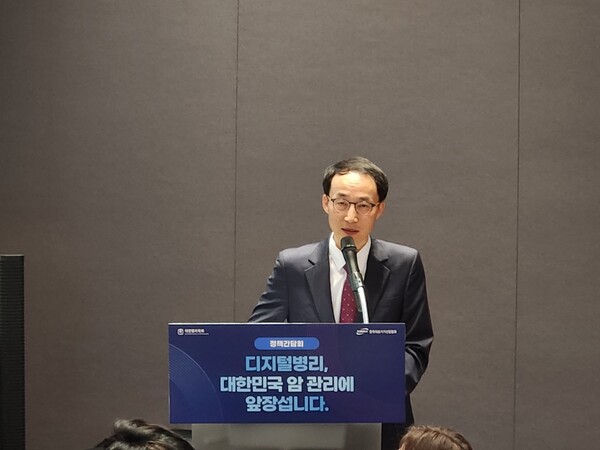A panel of experts in pathology emphasized the need to improve institutional support to address reimbursement issues, data storage, and sharing of pathological-related data in hospitals so that digital pathology can be widely implemented.

The Korean Society of Pathology (KSP) and the Korea Medical Device Industry Association (KMDIA) held a meeting sponsored by Roche Diagnostics Korea, to discuss ways to improve digital pathology in cancer management in Korea at Lunit’s headquarters in Gangnam, Seoul.
Professor Jung Chan-kwon of Pathology at the Catholic University of Korea, Seoul St. Mary's Hospital, and Director of Publication at the KSP explained that in 2019, digital pathology diagnostic systems were first introduced in Korea.
However, they mainly exist in large hospitals only and are not fully implemented.
"It is necessary not only to install equipment and seamlessly link computer systems with pathology laboratories but also to build a cloud to utilize medical data between hospitals,” said Professor Jung.
However, he expressed the difficulties to set up such an environment due to the lack of appropriate reimbursement, and the difficulties that hospitals face in maintaining digital pathology systems.

Pathology describes the scientific cause and effect of diseases where samples of body tissues are examined in a laboratory for diagnostic or forensic purposes. In particular, digital pathology refers to the conversion of pathological glass slides into digital images using a digital scanner, storing them, and using the images for pathological diagnosis.
Digitization will serve as a cornerstone for realizing customized treatment by enabling pathologists to incorporate artificial intelligence into their pathology workflows to increase efficiency.
Professor Lee Kyoung-bun of Pathology at Seoul National University Hospital (SNUH) and Director of Information at the Korean Society of Pathologists (KSP) also provided more evidence to support Professor Jung’s argument for digital pathology.
“As protein testing through immunohistochemistry and genetic testing are becoming essential for cancer diagnosis and precision medicine, digital pathology is an excellent way to replace glass slides because it can be accessed easily, shortening examination time, and is also easy to store,” said Lee. “Data sharing through digital pathology is a way to reduce the cost and time for patients to use medical institutions and can increase the value of each patient's medical information and bring about changes in the treatment and management of cancer, which is the number one cause of death in Korea."
"We have introduced a subscription model in Korea to lower the threshold for the adoption of digital pathology in actual pathology laboratories," said Roche Diagnostics Korea Head of Pathology, Jully Kim, in the panel discussion. "We are working to develop our own digital pathology AI algorithms to support domestic AI companies to expand overseas.”
Lunit and Deep Bio also introduced the AI models they were developing mentioning that AI can contribute to the discovery of new biomarkers for predicting patient prognosis but the reimbursement of the digital pathology systems is needed to accelerate its use in clinical practice.
Both KMDIA Chairman Yoo Cheol-wook and KSP President Han Hye-seung noted that the incidence of cancer in Korea is increasing but pathological diagnosis, which is the starting point for cancer treatment, remains an area that has not been digitized and is still lagging compared to developed countries.
"We will do our best to improve the digital pathology environment by pursuing reimbursement for patient-customized medical services," said Han.
Related articles
- Indica Labs, Lunit forge strategic alliance for integrated digital pathology AI workflow
- Philips Korea, AMC ink deal to advance digital pathology
- Roche Diagnostics wins nod for Alzheimer's disease CSF test in Korea
- Philips installs digital pathology solution at Konyang University Hospital
- Deep Bio's prostate cancer diagnosis software aims to enter US reimbursement market

